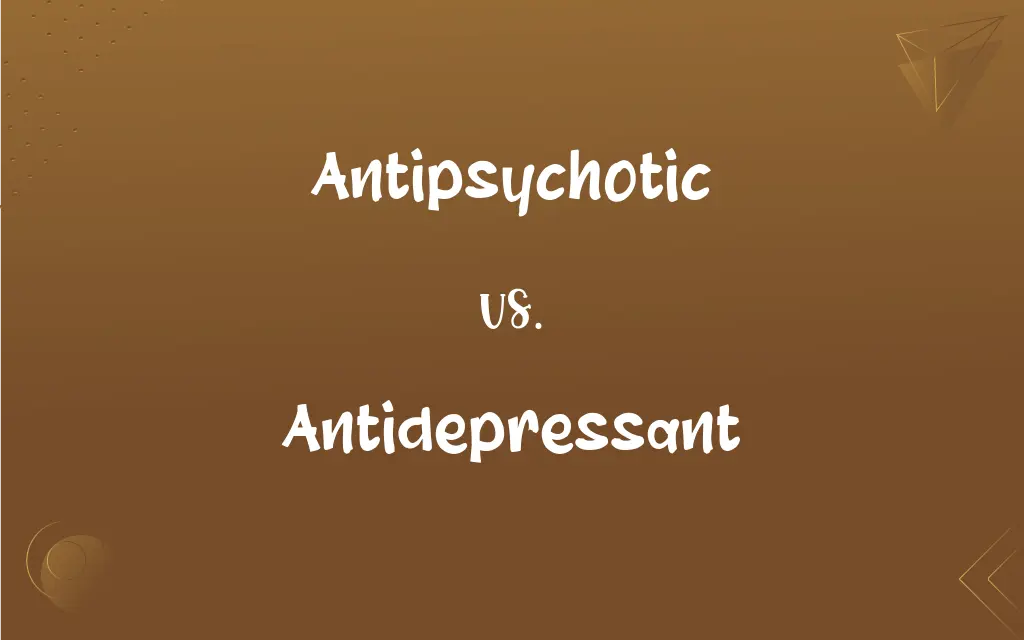Antipsychotic vs. Antidepressant: What's the Difference?
Edited by Harlon Moss || By Janet White || Published on December 14, 2023
Antipsychotics treat psychotic symptoms like delusions, while antidepressants manage mood disorders like depression.

Key Differences
Antipsychotics are medications primarily used to treat symptoms of psychosis, such as hallucinations and delusions, often associated with schizophrenia and bipolar disorder. Antidepressants, in contrast, are designed to alleviate symptoms of depression, including persistent sadness and lack of interest.
The action of antipsychotics typically involves the modulation of neurotransmitters like dopamine, crucial in managing psychotic symptoms. Antidepressants, on the other hand, commonly work by altering levels of neurotransmitters like serotonin and norepinephrine, which affect mood and emotional state.
Antipsychotic medications can also be used to treat severe agitation and bipolar mania. Antidepressants are often prescribed for a range of conditions, including various anxiety disorders, in addition to depression.
Side effects of antipsychotics may include drowsiness, weight gain, and in some cases, movement disorders. Antidepressants can cause side effects such as insomnia, sexual dysfunction, and sometimes increased anxiety.
Antipsychotics can be divided into two main classes: typical and atypical, with varying side effect profiles. Antidepressants are categorized into different classes, like SSRIs and SNRIs, each with distinct mechanisms of action and side effect profiles.
ADVERTISEMENT
Comparison Chart
Primary Use
Treat psychotic symptoms like delusions
Treat mood disorders like depression
Mechanism of Action
Modulate neurotransmitters like dopamine
Alter neurotransmitters like serotonin
Common Side Effects
Drowsiness, weight gain, movement disorders
Insomnia, sexual dysfunction, anxiety
Additional Uses
Treat agitation, bipolar mania
Treat anxiety disorders, other mood disorders
Classification
Typical and atypical antipsychotics
SSRIs, SNRIs, and other classes
ADVERTISEMENT
Antipsychotic and Antidepressant Definitions
Antipsychotic
They modulate brain neurotransmitters to reduce psychotic symptoms.
Antipsychotics are essential in treating schizophrenia.
Antidepressant
Antidepressants are medications used to treat depression.
The antidepressant improved her mood significantly.
Antipsychotic
Antipsychotics are drugs that treat symptoms of psychosis.
The antipsychotic helped manage his hallucinations.
Antidepressant
Antidepressants can also treat anxiety disorders.
Her antidepressant was also effective for her anxiety.
Antipsychotic
These medications come in typical and atypical classes.
He was prescribed an atypical antipsychotic for fewer side effects.
Antidepressant
They work by altering brain chemicals like serotonin.
His antidepressant was an SSRI, increasing serotonin levels.
Antipsychotic
Antipsychotics can be used for severe mental health crises.
In acute bipolar mania, antipsychotics can be effective.
Antidepressant
Different classes of antidepressants have varied effects.
She switched to an SNRI antidepressant for better results.
Antipsychotic
Counteracting or diminishing the symptoms of psychotic disorders, such as schizophrenia.
Antidepressant
Antidepressants can cause side effects like insomnia.
He experienced insomnia after starting the antidepressant.
Antipsychotic
An antipsychotic drug.
Antidepressant
A drug used to treat depression.
Antipsychotic
(pharmaceutical effect) Preventing or counteracting psychosis.
Antidepressant
(pharmaceutical drug) An agent that prevents or counteracts depression.
Antipsychotic
(pharmaceutical drug) Any of a group of drugs used to treat psychosis.
Antidepressant
(pharmaceutical effect) Preventing or counteracting depression.
Antipsychotic
Tranquilizer used to treat psychotic conditions when a calming effect is desired
Antidepressant
Any of a class of drugs used to treat depression; often have undesirable side effects
Antipsychotic
Antipsychotics also help in managing bipolar disorder.
Antipsychotics stabilized her mood fluctuations in bipolar disorder.
FAQs
Do antipsychotics have serious side effects?
They can, including movement disorders and metabolic changes.
What do antidepressants do?
Treat depression and other mood-related disorders.
Can antipsychotics treat depression?
Sometimes, particularly in cases of severe mood disorders.
Can antidepressants be used in children?
With caution and under strict medical supervision.
What are antipsychotics?
Medications that treat psychotic disorders and symptoms.
Are antidepressants addictive?
Generally not, but discontinuation should be gradual.
Do antidepressants improve sleep?
Some can, but others may cause insomnia.
Are antipsychotics used in anxiety treatment?
Rarely, and usually only in severe cases.
Are antipsychotics effective immediately?
They often take several days to weeks to show full effects.
How long do antidepressants take to work?
Often several weeks to see full effects.
Can antipsychotics be used for bipolar disorder?
Yes, particularly in managing manic episodes.
Are there different types of antipsychotics?
Yes, typical and atypical, with different side effect profiles.
Do antidepressants interact with other medications?
Yes, they can, so it's important to inform healthcare providers.
Can antidepressants cause weight gain?
Some can, though this varies by the type of medication.
Can antidepressants cause sexual side effects?
Yes, this is a common side effect.
Do antipsychotics affect cognitive functions?
They can, especially in higher doses.
Are antidepressants safe during pregnancy?
This depends on the specific medication and individual situation.
Can antipsychotics be stopped abruptly?
No, they should be tapered off under medical supervision.
Can antidepressants worsen depression initially?
Some people may experience increased anxiety or mood changes at first.
How are antipsychotics administered?
Orally or as long-acting injections.
About Author
Written by
Janet WhiteJanet White has been an esteemed writer and blogger for Difference Wiki. Holding a Master's degree in Science and Medical Journalism from the prestigious Boston University, she has consistently demonstrated her expertise and passion for her field. When she's not immersed in her work, Janet relishes her time exercising, delving into a good book, and cherishing moments with friends and family.
Edited by
Harlon MossHarlon is a seasoned quality moderator and accomplished content writer for Difference Wiki. An alumnus of the prestigious University of California, he earned his degree in Computer Science. Leveraging his academic background, Harlon brings a meticulous and informed perspective to his work, ensuring content accuracy and excellence.






































































